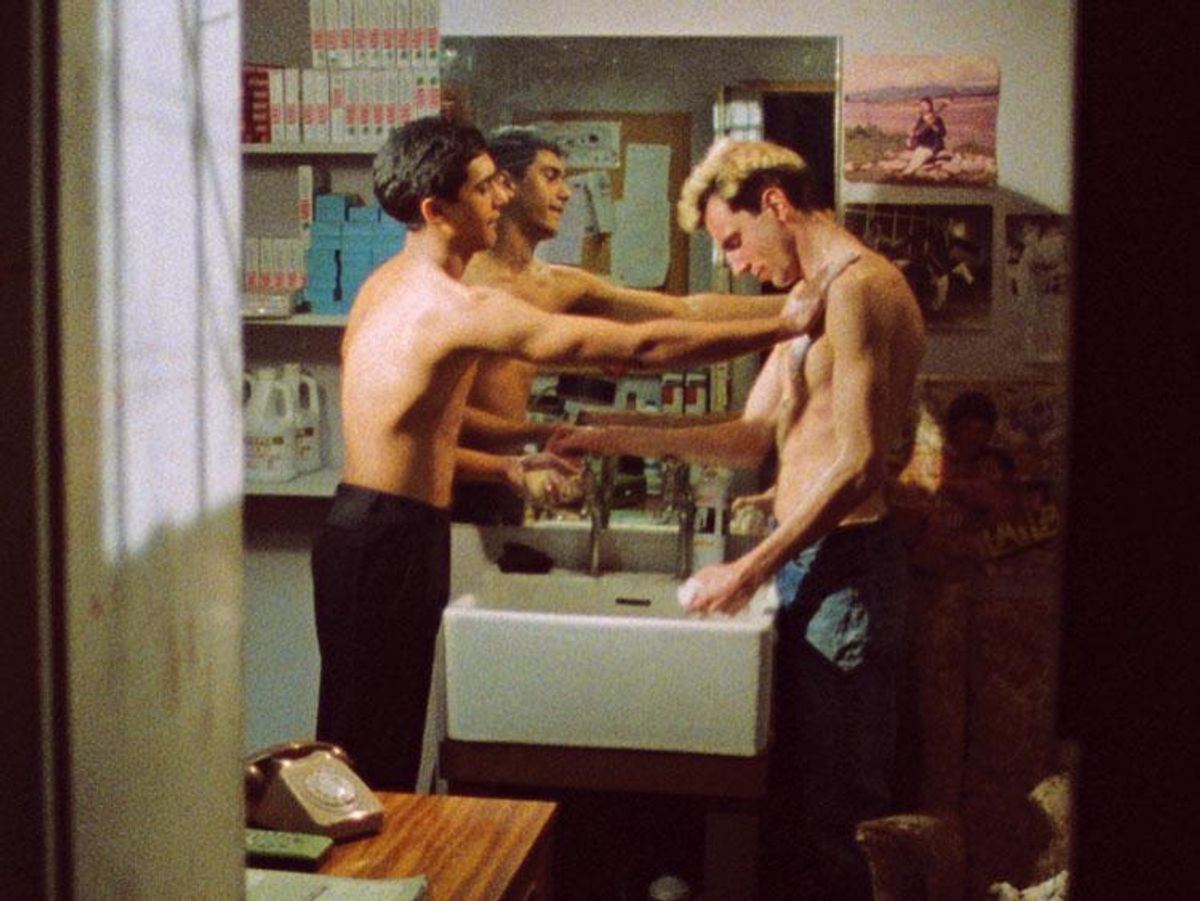
My Beautiful Laundrette writer Hanif Kureishi recalls the modest gem that broke racial and sexual barriers.
August 04 2015 8:52 AM EST
May 01 2018 11:46 PM EST
By continuing to use our site, you agree to our Private Policy and Terms of Use.

My Beautiful Laundrette writer Hanif Kureishi recalls the modest gem that broke racial and sexual barriers.
Gordon Warnecke & Daniel Day-Lewis | Photo: Courtesy of The Criterion Collection.
In the 1980s, it was very difficult to get films about minorities made, especially in Britain, and there were very few films with boys kissing. Homosexuality was rarely portrayed on screen in a loving and optimistic way. Most gay films involved suicide and death, whereas we wanted to make a cheerful film about boy love and a reasonably cheerful film about racial change in Britain. And we did that, I guess, by featuring in the middle of the film this rather lovely love story. Stephen Frears and I both wanted to show these boys loving each other's bodies and having a good time. And, of course, both of them are very beautiful. Daniel Day-Lewis was particularly beautiful then. The idea of seeing Daniel Day-Lewis getting fucked in the back room of a launderette seemed to me a very good idea. I couldn't think of any better way to entertain the public.
When we made the film we had no idea that it would be successful, or that it would be a hit. We made it very cheaply, and it never occurred to us that anyone in the public would ever pay to go see it. How could you ever think that? It was such an eccentric story, about a gay Pakistani and a gay skinhead, in love, running a launderette together. But it suddenly caught fire, and people wanted to see it in New York, they wanted to see it in Argentina, they wanted to see it all over the world. It amazed us and shocked us. It was the first film I'd ever written. I was living in a squat, and soon afterwards I went to the Oscars and I was sitting at a table with Bette Davis. It was mind-blowing. My life, Stephen's life, Daniel's life, and the lives of the other actors changed after this movie. I'm sorry Gordon Warnecke, who plays Omar, didn't become a bigger actor, because he's remarkable in the film -- his innocence, his enthusiasm, his sex appeal. But he still works. He's in TV and he's very fulfilled and happy.
I knew Stephen's work mostly from British television. I grew up in the London suburbs, and we just watched TV. We didn't really get interesting movies. I'd written the script when I was living in Pakistan, and Channel 4 had agreed to commission it -- they were committed to making films about contemporary Britain with people like Ken Loach, Peter Greenaway, Derek Jarman, and Neil Jordan. I found out from a friend of mine where Stephen lives and I went around to his house. Stephen and I really saw eye to eye, and we understood one another because we had a similar background. We wanted to make a film that was light and frivolous, but it would be serious about race and exploring this new sexuality, which people were certainly living in that time in London, but maybe was never seen on the screen. For example, when the two boys kiss, I remember people being horrified and shocked. You never saw a kiss like that between men in cinema before. It was a very original and beautiful moment.
I grew up in the 1970s under the influence of punk, and I love the punk ethos. The idea there was to be rebellious, to make a noise. You don't just make a film about an Asian kid struggling to make it; you make it into a gay kid who falls in love with a skinhead. And that's really much more interesting.
And it's still bigger than that. It's a much bigger film than a story about a native family or, indeed, about two gay friends. Somehow, we managed to mix those social issues into a love story, and somehow, as a person with a multiracial history, I was able to merge my interests of race and sexuality. It was appropriate for the time in South London. We were all on the left; we were all on the same side. So to make a gay love story that looked at minority communities just all fit together really perfectly.
If you're a Muslim kid in Britain today, coming out as gay is still a difficult thing. We have gay marriage, but in the community I come from, it's still really tough. People still come up to me, people from other Muslim families and say, "That film really helped me. It made me brave." And then there are places like Afghanistan or Pakistan or Iran, where there's very severe persecution of gay people. I hope that this movie, and the other stories I told, still have meaning for people who are living in much more difficult times and much more difficult places. Obviously I'm delighted that we have equality in London, but if you're living in Karachi it doesn't mean a thing. There's still a long way to go. -- As told to R. Kurt Osenlund
The Criterion Collection edition of My Beautiful Laundrette is now available on DVD and Blu-ray.
Beware of the Straightors: 'The Traitors' bros vs. the women and gays